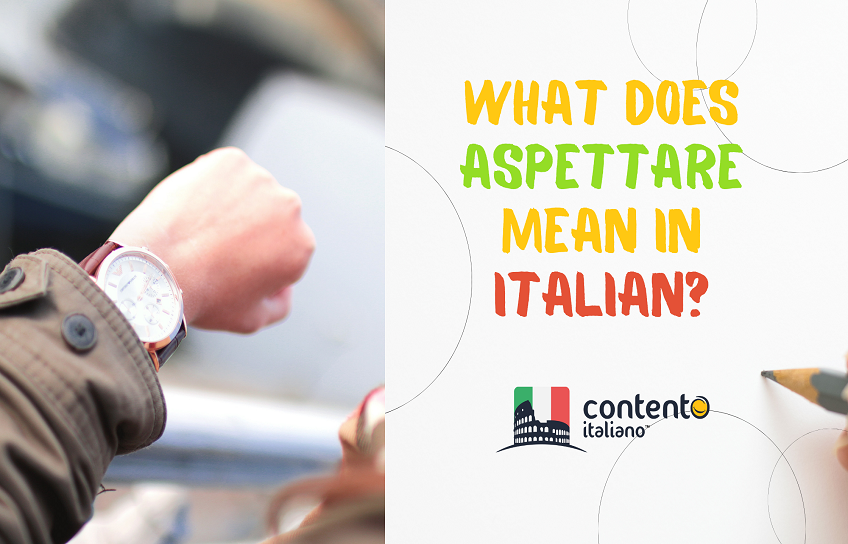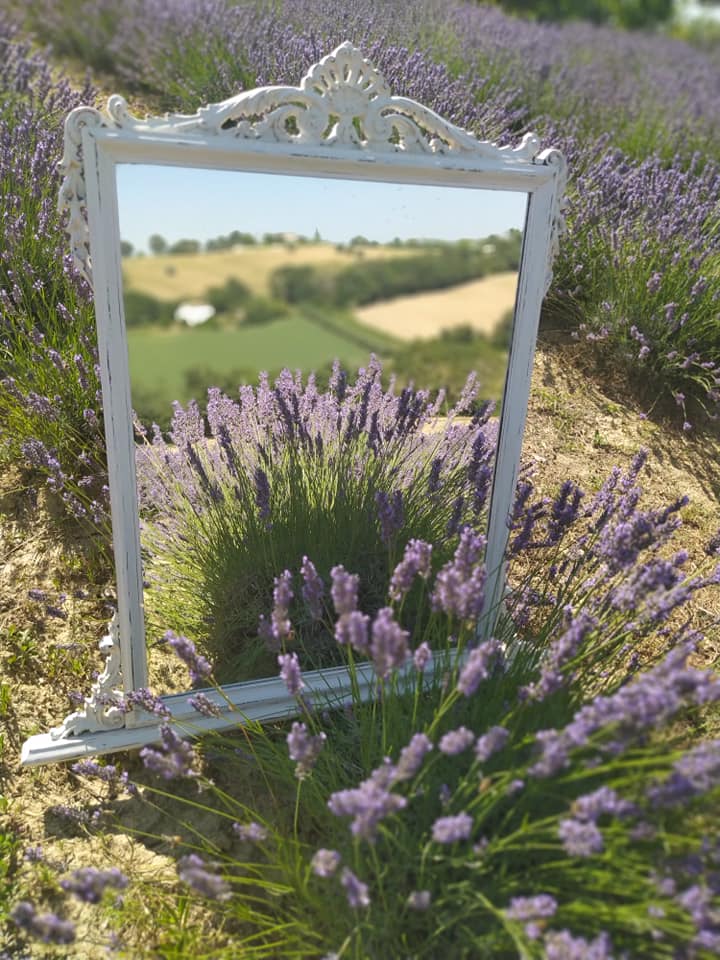
Written by Federica in Italian language
The meaning of aspettare vs aspettarsi
Aspettare in Italian means to wait, to await and, more rarely, to be in store for. It is very important to note that aspettare has a reflexive version, aspettarsi (literally, “to wait oneself”), which has a different meaning. Aspettarsi means to expect.
What conjugation does aspettare belong to?
Aspettare belongs to the first Italian conjugation. Its infinitive form ends in -are (aspettare), the participle form ends in –ato (aspettato) and the gerund ends in -ando (aspettando).
Is aspettare regular or irregular?
Aspettare is a regular verb, meaning that its terminations follow the same pattern throughout the conjugation as all other regular first-conjugation verb endings. This means that, if you can conjugate any first-conjugation Italian regular verb, then you’ll also be able to conjugate aspettare and vice-versa.
Does aspettare use an essere or avere auxiliary?
Italian compound tenses such as the present perfect (passato prossimo) require the main verb to be preceded by an auxiliary, essere or avere.
Aspettare is a transitive verb in Italian, meaning that it requires a direct object. Unlike the English to wait for, no preposition is needed after aspettare in Italian. For example, aspetto mia madre (I’m waiting for my mum).
Like other Italian transitive verbs, the verb aspettare takes the avere auxiliary in compound tenses (for example la bambina ha aspettato sua madre – the girl waited for her mum).

Aspettare can also be used reflexively (aspettarsi) to mean to expect (for example non mi aspettavo niente – I didn’t expect anything). In this case, like all other Italian verbs when used reflexively, it wants the essere auxiliary in compound tenses.
Uses of aspettare and aspettarsi
The verb aspettare, and its reflexive version aspettarsi, can be used in many different ways. Here are some examples:
- Non aspettarmi – don’t wait for me (note that this phrase uses the negative imperative, which is essentially the infinitive form preceded by non)
- Mi hanno fatto aspettare per due ore – they kept me waiting for two hours (literally, “they made me wait for two hours”)
- Il gatto aspetta la cena – the cat is waiting for dinner
- Non c’è problema, aspetto – no problem, I’ll wait
- Non sanno che cosa li aspetta – they don’t know what’s in store for them
- Sono un po’ delusa, mi aspettavo di meglio – I’m a little disappointed, I expected better (this sentence uses aspettarsi, to expect)
How to use aspettare and aspettarsi with conjuctions and prepositions
Aspettare and aspettarsi on their own
In some cases, aspettare and aspettarsi can be used on their own, without a preposition or a conjunction:
- Aspetta! – wait!
- Il gatto aspetta la cena – the cat is waiting for dinner
- Non ce l’ aspettavamo – we didn’t expect it (this sentence uses aspettarsi, to expect)
Aspettare che + subject + verb
Aspettare is also often followed by the conjunction che, which means that in Italian, and is used to introduce a subordinate clause. In English, aspettare che… means to wait for….something to happen/ someone to do something. The reflexive version aspettarsi che… means to expect that something will happen.
Here are some examples:
- Aspettavamo che ci telefonassero – we were waiting for them to phone us (literally in Italian “we were waiting that they would phone us”)
- Il gatto aspetta che preparo la cena – the cat is waiting for me to make dinner (literally in Italian “the cat is waiting that I make dinner”)
- Non si aspettavano che i soldi sarebbero finiti così presto – they didn’t expect the money to run out so soon (literally in Italian, “they didn’t expect that the money would run out so soon”)
Aspettare di + infinitive
The preposition di is also commonly used with aspettare. Di can take various meanings in Italian. Aspettare di + verb means to wait to do something and aspettarsi di + verb means to expect to do something. Note that with aspettare di the subject of the main and dependent clauses is the same:
- Aspettiamo di vedere cosa succede – let’s wait to see what happens
- Aspetto di sentire tue notizie – I’ll wait to hear your news
- Il gatto aspetta di mangiare – the cat is waiting to eat
- Non si aspettavano di finire i soldi cosi presto – they didn’t expect to run out of money so soon

- Non ci aspettiamo di dovere cambiare il programma – we don’t expect to have to change the plan
Italian set phrases with aspettare
Aspettare is a popular verb in Italian, so it features in a number of set phrases:
- Farsi aspettare – to keep someone waiting for you (literally, “to let oneself be waited for”, using fare in the reflexive form)
Hanno la brutta abitudine di farsi sempre aspettare
They have a bad habit of always keeping people waiting for them
- Aspetta e spera! – don’t hold your breath (literally, wait and hope, using aspettare and sperare in the second person imperative). This is an exclamation phrase used to meant that you are likely to wait a long time for something.
- Chi la fa l’ aspetti – what goes around comes around (this proverb uses the third person subjunctive of aspettare as an imperative)
Synonyms of aspettare
The closest synonym of aspettare is attendere.
Attendere is a false friend, in fact, it resembles the English to attend, but it actually means to wait. Attendere is a more formal verb than aspettare.
Nouns related to aspettare
There are two nouns which are closely related to aspettare:
- Sala d’ aspetto – waiting room/ lounge (literally, “room of wait”. This is a two-part noun, and only makes sense in conjunction with sala. Note that aspetto is also the first person singular of aspettare, meaning I wait).
- Aspettativa – expectation/ aspettativa di vita = life expectancy/ leave (in an employment setting aspettativa means leave, for whatever reason, but it’s not your holiday entitlement)
Ha superato di gran lunga le nostre aspettative
It exceeded our expectations by a mile
- Aspetto – looks/ appearance (the word aspetto is a derivative of the Latin verb aspicere, to look)
Note that aspetto is also the first person singular of aspettare, meaning I wait. Sometimes, you may have to rely on the context of the sentence to avoid being confused as to whether you are dealing with a verb or a noun.
Questa torta ha un aspetto bellissimo
This cake looks very beautiful

The complete conjugation of aspettare
In the table below you can see the complete conjugation of aspettare in all tenses and moods. Note that, for the reflexive aspettarsi (to expect), you should use the essere auxiliary instead of avere.
| Verb Tense | IO | TU | LUI/ LEI | NOI | VOI | LORO |
|---|---|---|---|---|---|---|
| Present indicative | aspetto | aspetti | aspetta | aspettiamo | aspettate | aspettano |
| Present perfect indicative | ho aspettato | hai aspettato | ha aspettato | abbiamo aspettato | avete aspettato | hanno aspettato |
| Imperfect indicative | aspettavo | aspettavi | aspettava | aspettavamo | aspettavate | aspettavano |
| Past perfect indicative | avevo aspettato | avevi aspettato | aveva aspettato | avevamo aspettato | avevate aspettato | avevano aspettato |
| Remote past indicative | aspettai | aspettasti | aspettò | aspettammo | aspettaste | aspettarono |
| Preterite perfect indicative | ebbi aspettato | avesti aspettato | ebbe aspettato | avemmo aspettato | aveste aspettato | ebbero aspettato |
| Simple future indicative | aspetterò | aspetterai | aspetterà | aspetteremo | aspetterete | aspetteranno |
| Future perfect indicative | avrò aspettato | avrai aspettato | avrà aspettato | avremo aspettato | avrete aspettato | avranno aspettato |
| Present conditional | aspetterei | aspetteresti | aspetterebbe | aspetteremmo | aspettereste | aspetterebbero |
| Past perfect conditional | avrei aspettato | avresti aspettato | avrebbe aspettato | avremmo aspettato | avreste aspettato | avrebbero aspettato |
| Imperative | aspetta | aspettiamo | aspettate | |||
| Present gerund | aspettando | aspettando | aspettando | aspettando | aspettando | aspettando |
| Past gerund | avendo aspettato | avendo aspettato | avendo aspettato | avendo aspettato | avendo aspettato | avendo aspettato |
| Present subjunctive | aspetti | aspetti | aspetti | aspettiamo | aspettiate | aspettino |
| Present perfect subjunctive | abbia aspettato | abbia aspettato | abbia aspettato | abbiamo aspettato | abbiate aspettato | abbiano aspettato |
| Imperfect subjunctive | aspettassi | aspettassi | aspettasse | aspettassimo | aspettaste | aspettassero |
| Past perfect subjunctive | avessi aspettato | avessi aspettato | avesse aspettato | avessimo aspettato | aveste aspettato | avessero aspettato |





